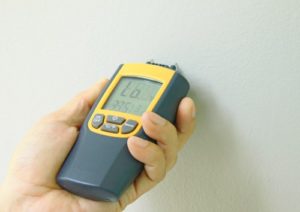 In our subtropical Georgia climate, outdoor humidity tends to stay high year round. Warm air holds more moisture than cold air and home humidity problems are more common during the summer months. Ready to take steps to address a humidity issue in your home? It’s important to understand what humidity is and how it impacts your living environment.
In our subtropical Georgia climate, outdoor humidity tends to stay high year round. Warm air holds more moisture than cold air and home humidity problems are more common during the summer months. Ready to take steps to address a humidity issue in your home? It’s important to understand what humidity is and how it impacts your living environment.
What is Humidity and How Does it Affect You and Your Home?
Relative humidity is the term heard most often to describe how much water vapor is in the air inside a home. It defines the percentage of moisture present in the air at a certain temperature in comparison to how much water vapor the air could contain at that temperature. When the air contains the maximum amount of moisture possible at a specific temperature, the relative humidity would be 100 percent. The ideal range for home humidity is between 30 and 50 percent. Do you have uncontrolled humidity inside your home? If so it can impact your health and comfort, energy consumption, and the condition of the structure itself in a number of ways.
- Comfort issues – When there’s excess moisture in the air, the body can’t cool down because perspiration doesn’t evaporate off the skin. This will leave you feeling hot and sticky.
- Health problems – High home humidity can cause breathing difficulties for anyone with asthma, respiratory ailments or heart conditions. Pests, mold, bacteria, viruses and dust mites can proliferate in moist, warm environments and trigger allergic reactions in sensitive individuals. In the summer, when temperatures are high, excess humidity can lead to heat exhaustion or heat stroke.
- High energy bills – HVAC equipment has to work harder to compensate for high humidity, so it consumes more energy and utility bills climb as a result.
- Structural damage – When the humidity level in your home is too high, you may see moisture stains appearing on the ceilings and walls, have mold developing in the bathrooms, and smell unpleasant musty odors. When humidity stays out of control for an extended period, trim and wood cabinets can deteriorate, wood floors can warp, and the structure itself can begin to decay from the inside out.
How to Take Control of Home Humidity
Are you seeing the evidence or feeling the effects of a humidity problem in your home? Invest in a device called a hygrometer. These inexpensive and easy-to-use devices measure the amount of moisture present and display an accurate relative humidity reading. Once you know the severity of the humidity problem, there are some effective ways for you to get it under control.
Ways To Lower Humidity
- Seal and insulate the ductwork. If HVAC ductwork isn’t properly sealed and insulated, moisture from unconditioned areas can be pulled into your living space.
- Check the clothes dryer vent. If it’s not vented to the outdoors or if the ducting seal is loose, moisture will be pumped into your home every time the dryer is used.
- Install moisture-sensing bathroom fans. Bathroom exhaust fans with humidity sensors can help remove excess moisture from showering and bathing. The sensor turns the fan on automatically when a certain level of moisture is detected, and keeps it running until the level drops.
- Assess the cooling system. If the equipment isn’t properly sized, it won’t dehumidify the space effectively. If you replace the equipment, opt for a model with a variable speed blower to enhance air circulation and humidity control.
- Add a whole-house dehumidifier. If the cooling system isn’t able to keep up with your indoor humidity, talk to an HVAC contractor about adding a dehumidifier to your air distribution system. This can boost comfort and reduce cooling costs, because they’re more effective at controlling humidity yet consume less energy than your air conditioner or heat pump.
Other Ways To Lower Humidity
- Install a crawl space vapor barrier. If your crawl space has a dirt floor, adding a plastic vapor barrier can prevent moisture from seeping into your living space.
- Clean the cooling system drain line and drip pan. If the system isn’t draining properly, it can make an existing humidity problem even worse.
- Address outdoor moisture infiltration. Keep the gutters cleaned out, extend the downspouts out further and make sure that the ground around your home’s perimeter slopes away from the foundation.
- Ventilate the attic and crawl space. Adequate ventilation in these unconditioned areas helps combat humidity and condensation that damages the structure.
If you need expert advice about proper home humidity in Savannah, Garden City, Tremont Park and the surrounding areas, contact us today at Byrd Heating and Air Conditioning.
Image Provided by Shutterstock.com

